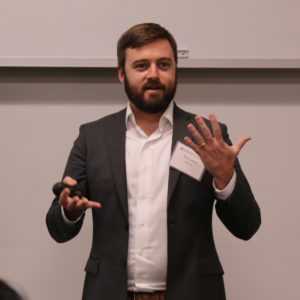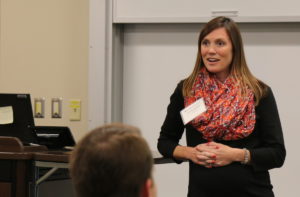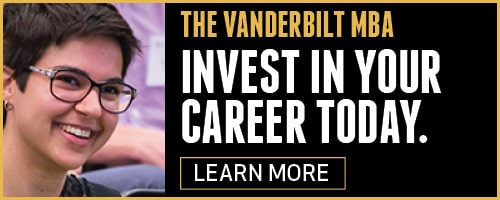By Kara Sherrer
Vanderbilt Business is one of the few b-schools to offer a concentration in human and organizational performance (HOP), which prepares graduates for careers in human resources or human capital consulting. Recruiting for these roles kicks off early in the fall, with info sessions happening in September and interviews beginning in October.
To help students prepare for recruiting, the HOP Association invited alumni from Bank of America, Bridgestone, Deloitte, HP, and Procter & Gamble back to campus last week to discuss their career paths and offer advice.
There are two main career tracks.
Generally, graduates in the HOP concentration take one of two career paths just out of school: corporate human resources or human capital consulting. However, as their careers progress, they often take on different roles and move between teams within their companies or firms. Some graduates even start off in corporate HR and then switch to human capital consulting, or vice versa, so this seemingly binary choice is far from set. “You’ve got a long career ahead of you…so there are going to be many jobs,” said Melissa Skinner Berlin (MBA’12), HR Business Partner and Leader of the HR MAP Program at HP.
Getting an MBA sets students up for success.

Tim Cooney (MBA’14)
The general management education of an MBA curriculum helps students who wish to pursue a career in either corporate HR or human capital consulting. Getting an MBA (as opposed to an HR-specific master’s degree) gives students a strong foundation in finance, management, and other business topics that prepare them well to partner with internal business leaders or to help other companies solve human capital issues. “You need to know what good management looks like,” said Tim Cooney, (MBA’14), Senior Consultant at Deloitte Consulting.
Corporate HR roles go by many names.
Most corporations have several different types of HR roles, and the names for them vary from company to company. Specialist roles support a number of teams on a specific task (such as compensation), whereas HR business partners support a few teams across the whole spectrum of HR issues. (There are also HR generalists, which are similar to business partners, but they work with teams at a lower level of leadership or that are specific to a particular geography or region.) If it’s not clear exactly what type of HR role is being offered and what the responsibilities will be, don’t be afraid to clarify. “Make sure you ask: how do you define an HR business partner at your company?” Skinner Berlin advised.
Human capital consulting offers a lot of variety.
While many human capital consultants initially work on a wide range of projects to get a broad range of experience fast, they can choose to narrow their focus as their careers progress — if they want to. Some choose to specialize in particular types of projects (such as implementing HR-related software) while others prefer to focus on clients in a particular industry, like financial services or life sciences. Of course, consultants can also opt to keep working across multiple different project types and industries. “In a nutshell, we help clients across all different types of industries leverage the power of their people, which is their most important aspect,” Cooney said.
HR and human capital issues are more relevant than ever.

Krystal Kender (MBA’11)
“From my perspective, HR is at the center of the most pressing issues at work,” Professor Tim Vogus said in his opening remarks, citing the #MeToo movement and Uber harassment suits as just two examples of currents events that intersect directly human capital issues. If you’ve ever wanted to help create workplaces where this sort of behavior wouldn’t be tolerated, you can have a big impact in the HR and human capital spaces. “It’s critically important for companies to play a role in changing the culture of the United States,” affirmed Krystal Kender (MBA’11), Senior Human Resources Manager at Procter & Gamble. “Diversity and inclusion doesn’t happen by accident.”
Changing demographics directly impact the workforce.
For those working in HR and human capital, populations statistics aren’t just interesting numbers: Demographic growth and changes affects the workforce, which directly impacts human resources and capital. Jeanine Wilson (MBA’05), SVP and Human Resources Executive at Bank of America, discussed numerous relevant trends that affect workforce planning, including the growing numbers of minorities and immigrants, aging baby boomers, and female representation across industries. “These obviously have implications for us as HR staff,” she said.
Big Data is also changing HR.
It’s no secret that Big Data is changing the way many jobs function, and the same is true for human resources. While data analytics within HR is a relatively new space, it’s becoming more important by the day, and new roles within HR analytics are opening up. “We get the data that you need to make better, more informed decisions,” said Dan George (MBA’14), an HR veteran who most recently oversaw workforce analytics, reporting, and data strategy at Bridgestone.
Want to learn more about getting an MBA at Vanderbilt Business? Visit the program page or request more information.
